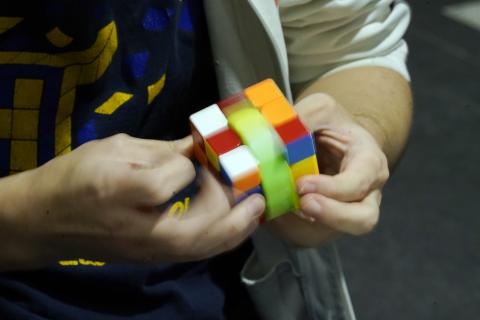
Iran-backed groups willing to kidnap, kill to protect corrupt revenue streams: Experts
Iraq ranked 160 out of 180 in Transparency International’s Corruption Perceptions Index
LONDON: Iran-backed militias in Iraq’s Popular Mobilization Forces (PMF) employ assassinations, kidnappings and other forms of violence in order to protect the income they derive from widespread and deep-rooted corruption in Iraq, a panel of experts said on Thursday.
At an online event hosted by British think tank Chatham House and attended by Arab News, Mohammad Al-Hakim, senior advisor on economic reform to Iraq’s prime minister, said the country’s corruption crisis extends back to the days of Saddam Hussein’s rule, but is now systemic, politically sanctioned and backed by the threat of violence by Iran-backed groups.
“There’s a deep problem with the structure of the Iraqi state. This is very much a legacy that needs to be addressed,” Al-Hakim said. “The Iraqi state system has been deteriorating over 50 years.”
Iraq ranks in the bottom 20 countries in the world in Transparency International’s Corruption Perceptions Index.
Government employees from the bottom to the top of Iraqi governance are engaging in systematic corruption, said Al-Hakim.
At the highest levels of the Iraqi state, civil servants have developed relationships with politicians that they use to line their own pockets and make money for their political allies.
Maya Gebeily, Middle East correspondent at the Thomson Reuters Foundation, said one of the underpinnings of this system is the PMF, which operates as a “cartel,” using violence to suppress any opposition or attempt to upturn the status quo.
“It’s important to think about this corruption as a cartel. There are players in the cartel who agree with each other on how to divvy up the spoils that are coming in either from tariffs, from a specific project, or into the ministry,” she added.
“That’s why there are no ‘turf wars’ … because everyone is benefitting from this system. As soon as the bodies start showing up, that means an economic loss.”
But that has not deterred the militias from violence, Gebeily said. They just do not use it against each other.
“What they’re doing is using violence against anybody who’s trying to root out corruption. Researchers, activists and others who’ve been extremely vocal about corruption have been kidnapped, murdered or otherwise harassed,” she said.
Law-abiding officials have been physically threatened, beaten up or had their families attacked when they refused to be complicit in corruption.
“Armed groups use violence as an enforcement mechanism to make sure their economic interests are secured,” said Gebeily.
“Let’s say you want to import cigarettes. Cigarettes are extremely lucrative to import, so you need an extremely powerful group — and the one I discovered was importing them was Kata’ib Hezbollah — to be involved in that import.”
Iraq’s most powerful armed militia, Kata’ib Hezbollah has directly attacked US forces in the country.
It is also widely believed to be behind a string of assassinations and kidnappings, including that of Hisham Al-Hashimi, a journalist who described the Iran-backed group as “the strongest and most dangerous group in the so-called Islamic resistance.”
Renad Mansour, director of the Iraq Initiative at Chatham House, said: “If we’re talking about power and where it lies in the Iraqi state, you only need look at the attempt by the prime minister to arrest Qasem Muslih, the leader of a brigade in the PMF, and why the prime minister was unable to keep someone who he accused of having a role in assassinations in jail.”
Mansour added: “Actually, these aren’t just militias. They have more connectivity to Iraq’s Parliament, to Iraq’s judiciary, than the prime minister does. They’re effectively connected to power in a more central way than the traditional and formal heads of state.”
This reveals the true and farcical nature of power in Iraq, Mansour said. “Those sitting on top of the system struggle with access to the state that they’re meant to be head of,” he added.
“Those apparently sitting outside the state actually have more connectivity to the essence, the power, the core of the state.”












